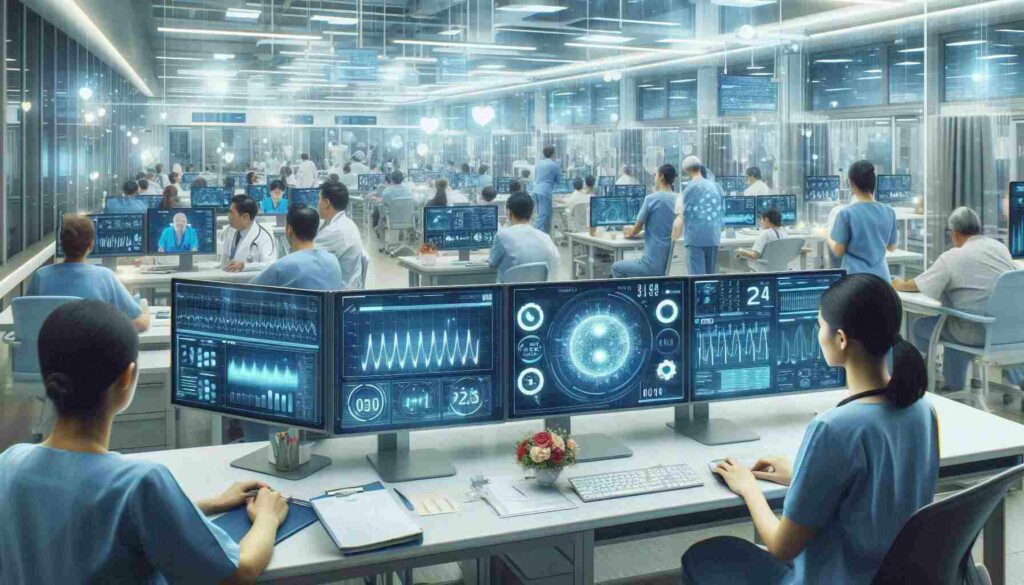
AI CERTS
6 months ago
AI-Driven Healthcare Solutions: Transforming the Future of Medicine
AI-Driven Healthcare Solutions are reshaping the medical field by driving innovations in diagnostics, treatment plans, robotic surgeries, and patient care. From predictive analytics to personalized health monitoring, these solutions offer powerful ways to improve efficiency, accuracy, and accessibility across medical practices.

This article provides an in-depth look at how AI-Driven Healthcare Solutions are powering breakthroughs in medicine, alongside top certifications to help professionals stay at the forefront of this trend.
Technologies Enabling AI in Healthcare
The success of AI-Driven Healthcare Solutions relies on cutting-edge technologies that enable advanced decision-making and streamlined medical operations. Each of these technologies plays a vital role in enhancing the effectiveness of AI in healthcare.
1. Machine Learning for Predictive Analytics
Machine learning is central to AI in healthcare, enabling predictive analytics that help detect health risks early. Hospitals increasingly rely on algorithms to reduce readmission rates by identifying patients prone to complications before discharge.
These AI-driven applications not only help in forecasting but also empower healthcare professionals to tailor interventions based on predicted outcomes. For instance, by analyzing historical patient data, AI systems can alert healthcare providers about patients who may require additional monitoring or proactive care, effectively reducing complications and hospital visits.
2. Natural Language Processing for Medical Documentation
Natural Language Processing (NLP) is revolutionizing documentation management within AI-Driven Healthcare Solutions by transforming unstructured medical data into actionable insights. AI chatbots also leverage NLP to answer patient queries accurately, providing immediate assistance.
The integration of NLP into healthcare solutions streamlines communication, allowing healthcare professionals to spend more time on patient care rather than paperwork. This technology enhances the accuracy of medical records and improves patient interaction through virtual health assistants who can manage inquiries efficiently.
3. Computer Vision in Imaging Diagnostics
Computer vision is a key component of AI in healthcare that enhances the interpretation of X-rays, MRIs, and CT scans. AI-based imaging tools can detect early signs of diseases like cancer, improving patient outcomes through timely interventions.
Incorporating computer vision into healthcare solutions allows radiologists to focus on complex cases while the technology handles routine analysis. This synergy not only increases the efficiency of diagnostics but also supports early treatment plans that can save lives.
Technologies such as machine learning, NLP, and computer vision are driving innovation in healthcare solutions. Next, we’ll discuss how these tools enhance personalized care and diagnostics.
Personalized Care and Diagnostics
Personalized care is a significant outcome of AI-Driven Healthcare Solutions, ensuring patient-specific treatment plans. AI technologies utilize patient data to deliver customized care, improving recovery outcomes for patients.
AI-Driven Solutions for Disease Detection
With AI solutions, models analyze medical history and lifestyle data to facilitate early disease detection. These applications play a vital role in predicting conditions like diabetes and heart disease long before symptoms appear.
For example, wearable devices that track biometric data can alert patients and physicians about concerning trends, prompting early intervention. This proactive approach is a hallmark of healthcare solutions, where the emphasis is on prevention rather than reactive care.
Tailored Treatment Plans Powered by AI
Personalized care plans leverage insights from patient history, genetics, and medical imaging. AI algorithms create precision treatments that reduce the risk of side effects, ensuring better patient experiences.
AI-driven solutions empower healthcare providers to consider unique factors influencing a patient's health, resulting in more effective and targeted treatment strategies. These approaches enhance patient satisfaction and overall health outcomes through tailored interventions.
The integration of personalized diagnostics and tailored treatments reflects the growing impact of AI in healthcare. In the next section, we explore advancements in robotic surgeries.
Robotic Surgeries: Precision in Healthcare
The adoption of robotics, guided by artificial intelligence, has elevated precision in surgical procedures. These advanced technologies empower surgeons to conduct minimally invasive operations with unparalleled accuracy.
AI Robotics for Complex Surgeries
AI-enabled robotic platforms, like the Da Vinci system, assist in performing delicate surgeries with smaller incisions. These healthcare solutions reduce complications and improve patient recovery times significantly.
Robotic surgeries equipped with AI capabilities enhance precision while minimizing the physical strain on surgeons, leading to better outcomes and shorter recovery periods for patients. These advancements exemplify the transformative power of AI in modern medicine.
Real-Time Data Analysis During Surgeries
During operations, AI solutions monitor patient vitals in real time, offering critical insights to surgeons. AI systems predict potential issues, allowing immediate corrective action and ensuring safer outcomes.
By integrating real-time data analytics, AI-driven solutions create a dynamic surgical environment where the surgical team is better equipped to handle complications as they arise. This adaptability is crucial in maintaining patient safety and enhancing surgical success rates.
Robotic surgeries are transforming the medical landscape with the power of AI solutions. Next, we explore how AI supports virtual health assistants and remote monitoring.
Virtual Health Assistants and Remote Monitoring

AI solutions include AI-powered virtual health assistants, which are becoming integral to chronic disease management and remote care. These applications enable round-the-clock monitoring, reducing hospital admissions and improving patient engagement.
Virtual Assistants for Disease Management
AI-powered virtual assistants help manage chronic conditions like hypertension and diabetes by continuously monitoring patients’ vitals. They ensure medication adherence through automated alerts and reminders.
These virtual assistants, integrated into healthcare solutions, provide personalized support and education to patients, encouraging lifestyle changes that lead to better health outcomes. Their constant availability empowers patients to take charge of their health in ways previously unattainable.
Wearables and Remote Patient Monitoring
Wearable devices, integrated with AI technologies, collect real-time health data as part of AI-Driven Healthcare Solutions. This data allows doctors to make early interventions, preventing complications and improving patient outcomes.
AI systems provide insights from wearables, facilitating timely medical responses and personalized recommendations based on individual health patterns. This innovative approach fosters a proactive healthcare model that benefits both patients and healthcare providers.
Virtual assistants and wearables reflect the growing role of AI in patient management. In the next section, we explore the automation of healthcare operations.
Streamlining Operations with AI in Healthcare
AI solutions focus on automation to reduce administrative workload, enabling healthcare professionals to prioritize core patient care. These systems improve resource management and operational efficiency significantly.
AI for Scheduling and Resource Optimization
Hospitals utilize AI solutions to optimize appointment schedules and resource allocation. This ensures patients receive timely care and minimizes wait times.
AI algorithms analyze patient flow, historical data, and resource availability to create efficient schedules, enhancing the overall patient experience. By optimizing these elements, AI-driven solutions significantly improve healthcare delivery and operational productivity.
AI in Healthcare for Automated Billing
AI-driven billing systems eliminate manual errors, speeding up the insurance claim process. These healthcare solutions also simplify the patient billing experience by generating accurate invoices.
These automated systems ensure transparency and accuracy, which is critical for maintaining patient trust. With AI-driven solutions streamlining billing operations, healthcare organizations can focus more on patient care rather than administrative hurdles.
Automation is redefining efficiency through AI solutions in healthcare. In the next section, we focus on innovations in drug discovery.
Innovations in Drug Discovery with AI
AI-driven healthcare solutions are revolutionizing drug discovery, accelerating the development of new treatments, and helping pharmaceutical companies bring medications to market faster. These applications streamline research and clinical trials.
AI for Identifying Potential Drugs
AI algorithms analyze molecular data to identify promising drug candidates. This approach shortens the preclinical research phase, significantly reducing time-to-market for new treatments.
The ability of AI to process vast datasets quickly allows researchers to discover potential drugs that traditional methods might overlook. This transformative approach is paving the way for novel therapies and treatments that can revolutionize patient care.
Optimizing Clinical Trials with AI
AI tools select suitable participants for clinical trials, ensuring diverse representation. They predict patient responses, helping researchers modify protocols for better results.
By enhancing the efficiency and effectiveness of clinical trials, AI-driven solutions enable faster approvals for new therapies, ultimately benefiting patients who need these treatments.
Drug discovery processes benefit immensely from AI innovations. The next section addresses ethical concerns in AI adoption.
Ethical Challenges and Data Security in AI Healthcare Solutions
Despite the numerous benefits, AI in healthcare raises concerns about bias, fairness, and privacy. Healthcare providers must address these issues to maintain patient trust in AI solutions.

Bias in AI Algorithms
AI models may reflect biases present in their training data, leading to unintended discrimination. Ensuring fairness in these algorithms is essential for providing equitable care.
Addressing bias is a critical challenge in the adoption of AI technologies, as professionals must be aware of potential disparities that can arise from algorithmic decision-making.
Data Privacy and Security
Healthcare organizations must comply with privacy laws like HIPAA when implementing AI tools. These technologies demand robust security measures to protect sensitive patient information.
The implementation of strong data governance policies is vital to ensuring that AI technologies can be utilized safely and ethically, fostering trust among patients and healthcare providers alike.
Conclusion: Ethical considerations are crucial for the sustainable adoption of AI in healthcare. Next, we explore certifications that empower professionals in the field.
Top Certifications for AI Healthcare Professionals
Earning relevant certifications is crucial for professionals aiming to excel in AI-Driven Healthcare Solutions. These certifications not only enhance knowledge and skills but also signal to employers a commitment to staying current in this rapidly evolving field. Below are some of the top certifications available, along with detailed descriptions and links for more information.
1. AI+ Healthcare Certification
- Overview: This certification program provides comprehensive training in how artificial intelligence can be applied within the healthcare industry. Participants will learn about various AI technologies, including machine learning and natural language processing, and their practical applications in clinical settings.
- Key Skills Acquired:
- Understanding of AI concepts and methodologies
- Ability to implement AI technologies in healthcare
- Insights into ethical implications of AI in medicine
- Provider: AI CERTs
- Format: Online
2. Data Science for Healthcare Certification
- Overview: This program focuses on the application of data science techniques in the healthcare sector. Participants will learn to analyze healthcare data and leverage AI to improve patient outcomes, with a strong emphasis on real-world case studies.
- Key Skills Acquired:
- Data analysis and visualization
- Machine learning applications in healthcare
- Predictive modeling and statistical analysis
- Provider: Coursera
- Duration: 4-6 months
- Format: Online
3. Health Informatics Certification
- Overview: This certification covers the intersection of health information systems and AI technologies. Participants will learn about health data management and how AI can enhance patient care delivery through effective data use.
- Key Skills Acquired:
- Knowledge of health informatics systems
- Data management and governance
- Application of AI tools in healthcare environments
- Provider: AHIMA
- Duration: Varies
- Format: Online and in-person options available
4. AI Ethics in Healthcare Certification
- Overview: As AI continues to integrate into healthcare, understanding the ethical implications is vital. This certification program focuses on best practices for ensuring fair and unbiased AI applications in medical settings.
- Key Skills Acquired:
- Ethical considerations in AI development
- Frameworks for assessing bias in AI systems
- Strategies for promoting fairness in healthcare AI applications
- Provider: University of California, Berkeley
- Duration: 8 weeks
- Format: Online
5. Certified Health Data Analyst (CHDA)
- Overview: Offered by the American Health Information Management Association (AHIMA), the CHDA certification recognizes individuals with the expertise to manage and analyze health data. It focuses on statistical methods and data analysis techniques essential for improving healthcare outcomes.
- Key Skills Acquired:
- Advanced data analysis and interpretation
- Understanding of health data management principles
- Effective communication of data-driven insights
- Provider: AHIMA
- Duration: Self-paced study, with a recommended preparation time of 6 months
- Format: Exam-based certification
Conclusion
AI-Driven Healthcare Solutions are revolutionizing how we approach healthcare, from diagnostics and treatment to operational efficiency and ethical considerations. By harnessing the power of AI technologies, healthcare providers can deliver personalized, efficient, and effective care.
As the healthcare landscape evolves, professionals must seek relevant certifications to stay ahead of the curve. With AI solutions leading the way, the future of medicine looks promising.
For more information on AI-Driven Healthcare certification and to enroll in a program, visit AI CERTs.
Here are our other articles you might be interested :